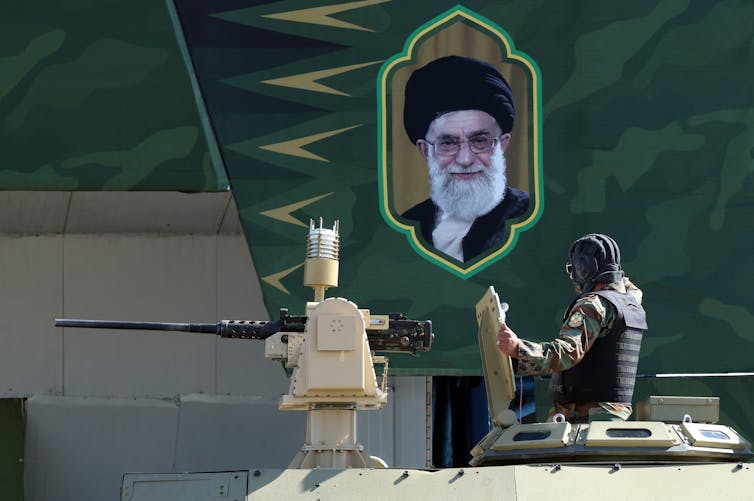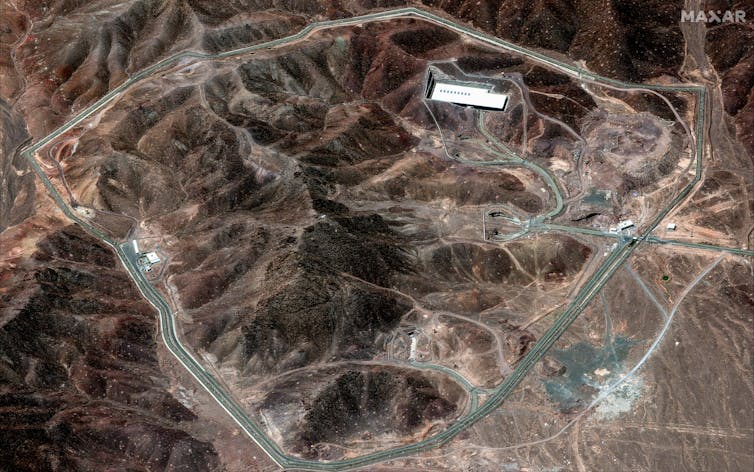This article was first published in The Conversation UK’s World Affairs Briefing email newsletter. Sign up to receive weekly analysis of the latest developments in international relations, direct to your inbox.
Israel’s attack on Iranian nuclear facilities and military leadership last week has quickly escalated into the most severe conflict between the two foes in decades. They have been trading missile attacks, with Israel now hinting that it seeks to overthrow the government in Tehran.
On June 19, after an Iranian missile struck a hospital in the Israeli city of Beersheba, Israel’s defence minister, Israel Katz, announced that he had instructed the military to increase the intensity of attacks against Iran. The goal, he said, was to “undermine the regime”.
Israel has long made it clear that it would like to see a change of government in Tehran – though not necessarily through direct military action. Katz’s comments, which also involved saying that the Iranian supreme leader, Ayatollah Ali Khamenei, “will pay for his crimes”, are the first time Israel has claimed regime change as an official goal since the conflict with Iran began.

Sign up to receive our weekly World Affairs Briefing newsletter from The Conversation UK. Every Thursday we’ll bring you expert analysis of the big stories in international relations.
We asked Farhang Morady, a lecturer in international development at the University of Westminster, how precarious the Iranian government’s grip on power really is. He explains that, despite being under immense pressure, the regime is not at imminent risk of collapse.
Israeli strikes have inflicted significant damage, Morady says. But they have not caused the downfall of the regime’s core institutions. Khamenei has reshuffled Iran’s military leadership to maintain stability and control, swiftly appointing successors to replace assassinated commanders.
At least publicly, Morady writes, the Iranian elite is eager to demonstrate its position that the country is capable of enduring the crisis without giving in to foreign pressure. At the same time, the regime has been employing back-channel diplomacy to ensure its survival. It has even reportedly indicated that it is willing to suspend uranium enrichment to maintain itself.
Read more:
Israel’s attacks have exposed weaknesses in Iran, but it’s in little danger of collapsing

Abedin Taherkenareh / EPA
However, pressure on the regime could be set to intensify. US president Donald Trump has made it clear that he is considering joining Israel’s campaign against Iran.
As part of a string of social media posts, which followed his early exit from the G7 summit in Canada, Trump described Khamenei as an “easy target” who is safe “for now”. Then, on June 18, when asked a question about the US striking Iran, Trump said: “I may do it, I may not do it.”
Whether Trump’s antics are a bluff to force Iran to negotiate an end to the conflict – or, in his own words, an “unconditional surrender” – remains to be seen.
But in the view of Natasha Lindstaedt, a professor in the department of government at the University of Essex, Trump’s statements suggest he is being won over by the Israeli government’s pressure campaign to convince Washington that the time is right for a joint military assault on Iran.
The US possesses the 30,000-pound “bunker buster” bomb, and the B-2 stealth bomber to carry it, capable of destroying Iran’s deep-lying uranium enrichment sites. Lindstaedt sees a situation arising soon where Israel’s prime minister, Benjamin Netanyahu, convinces Trump to use this weapon against Iran.
Read more:
Trump breaks from western allies at G7 summit as US weighs joining Iran strikes
Any American military action in Iran has the potential to cause a split in Trump’s base of support, says Richard Hargy, an expert on US politics at Queen’s University Belfast. In this piece, Hargy details how Trump’s condemnation of former US presidents for leading the US into foreign wars won him plaudits with his “make America great again” (Maga) base.
These people remain fiercely opposed to US involvement in another conflict in the Middle East. Steve Bannon, an America-first backer and staunch Trump ally, has warned that US action in Iran would “blow up” Trump’s coalition of support.
At the same time, Hargy says Trump has several prominent Republican hawks urging him to take military action against Iran. Senator Lindsey Graham, for example, has this week called on Trump to go “all in” to help “Israel eliminate the [Iranian] nuclear threat”.
Whatever Trump decides over Iran will be a pivotal moment for his presidency.
Read more:
Iran air strikes: Republicans split over support for Trump and another ‘foreign war’
Confrontation was inevitable
A direct conflict between Israel and Iran has been a long time coming. Tensions between the two countries have been simmering for years. But why did Israel chose to act now? Matthew Moran and Wyn Bowen, professors of international security at King’s College London, say two factors have converged that made this confrontation all but inevitable.
First, Iran’s regime has been left exposed by events over the past 12 months or so. Israeli strikes in October 2024 seriously degraded Iran’s air defences, while Israel’s military response to the October 7 Hamas attacks has decimated Iran’s regional proxy network. These events have undermined Iran’s ability to deter adversaries and have emboldened Israel.
And second, Iran’s nuclear programme has advanced since Trump withdrew the US from a deal negotiated during Barack Obama’s presidency that greatly rolled back Iran’s nuclear capabilities.
Moran and Bowen point to a recent report by the Washington-based Institute for Science and International Security that suggests Iran could convert its current stock of 60% enriched uranium into enough weapons-grade uranium for seven nuclear weapons. This could be done in as little as three weeks.
US national intelligence and the International Atomic Energy Agency say there is no evidence to suggest Iran is, in fact, looking to build a nuclear bomb. Nevertheless, even the possibility that Iran was close to developing one crossed an Israeli red line and triggered action.
In the words of Moran and Bowen: “Iran’s brinkmanship around its effort to hedge its bets on a nuclear option meant it was always operating in a dangerous space.”
Read more:
Israeli aggression and Iranian nuclear brinkmanship made this confrontation all but inevitable

Maxar Technologies Handout / EPA
According to Brian Brivati of Kingston University, there is one other factor may have encouraged Israel to take action against Iran: the collapsing credibility of the international legal order.
In this piece, Brivati traces how the Israeli and US governments have systematically weakened the global institutions designed to uphold international law over the past few years. The Israeli government has ignored court rulings over its actions in Gaza, while the US has disabled the mechanisms of accountability.
This has created a situation in which states can act with impunity, confident that international mechanisms can be ignored. Israel’s initial attack on Iran, which was conducted without authorisation from the UN security council, is a symptom of this. And other global powers like Russia and China may now look to follow its lead.
We have arrived at a moment so stark, Brivati says, that it should be seen as a turning point for the international order.
Read more:
Israel, Iran and the US: why 2025 is a turning point for the international order
World Affairs Briefing from The Conversation UK is available as a weekly email newsletter. Click here to get updates directly in your inbox.




